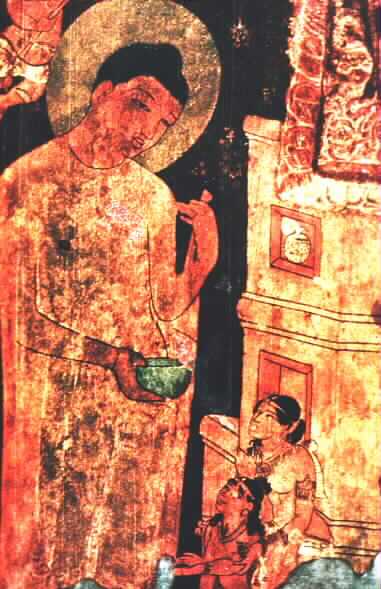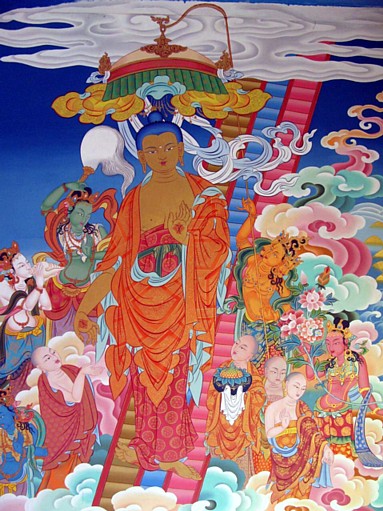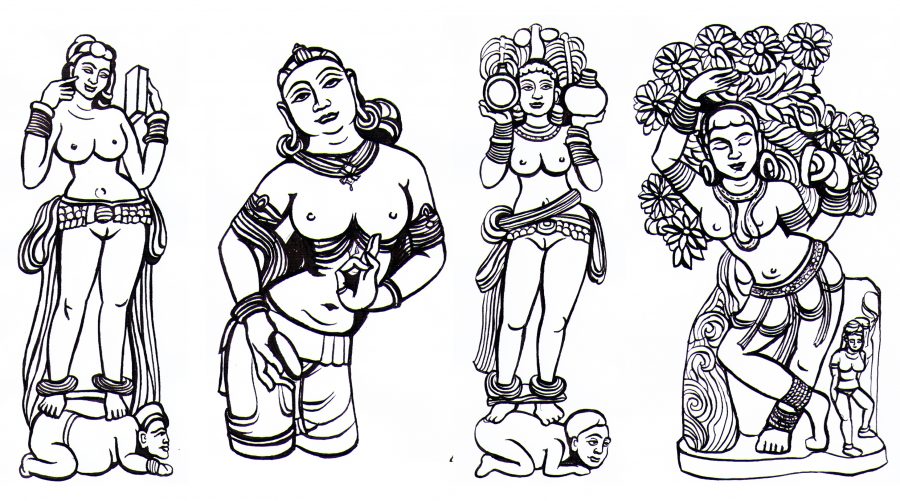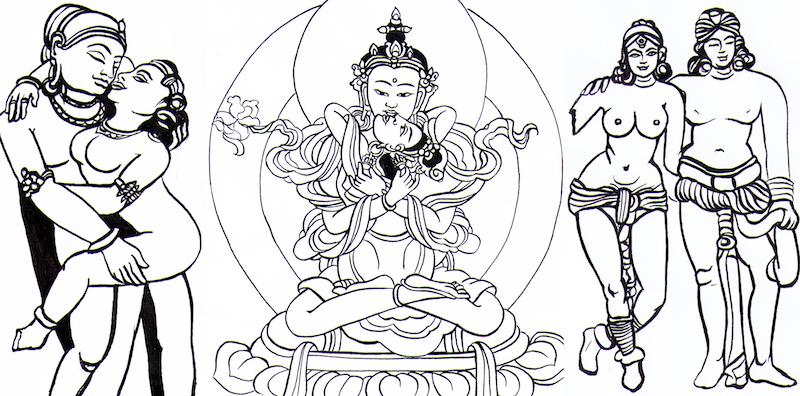White Sarasvati, mural at the Namdroling Monastery in South India. Image courtesy of the author Sarasvati (Tib. yang chenma) is the goddess of knowledge, education, music, poetry, and culture. Her name can be found in the Vedic hymns. In these ancient Indian texts, she is worshiped as the divine power of ritual chants and sacrificial […]
Lyudmila Klasanova
Marichi, Goddess of the Dawn

Marichi. From theyoginiproject.org Marichi (from Sanskrit “ray of light”) is the Goddess of the Dawn, who is revered in the Buddhist tradition as a heavenly warrior and powerful protector. Her name in Tibetan is Oser Chenma, which means “Goddess of the Great Light.” Marichi protects human beings from physical dangers and harm, sudden death, thieves, […]
Yashodhara: The Buddha’s Wife in Many Lives

Buddha begging for food in front of his wife Yashodhara and his son Rahula. Cave 17, Ajanta. From personal.carthage.edu Yashodhara, which means “Bearer of Glory,” was the wife of Prince Siddhartha and the mother of their son, Rahula. She was born in the Sun Clan, to the daughter of King Suppabuddha and Amita. Amita was […]
The Great Deeds of Gautami: The Achievements of the First Buddhist Nun

Buddha Shakyamuni with Mahaprajapati Gautami. From dhamma-stream.blogspot.com The stories of a number of nuns (Skt. bhikshuni) in early Buddhism were written down in various parts of the Pali Buddhist scriptures, especially in the Therigatha, commonly translated as Verses of the Elder Nuns, composed about 600 BCE, and also in the Theri Apadana or The Great […]
Mahaprajapati Gautami: The First Buddhist Nun

Statue of Mahaprajapati Gautami at Upaya Zen Center, USA. From womeninbuddhismtour-india.blogspot.com Mahaprajapati Gautami was the aunt and foster mother of prince Siddhartha. She raised him after the death of her sister, the Buddha’s mother: Mayadevi. The meaning of the Sanskrit name Mahaprajapati is “The great patroness of all beings” and Gautami is the female equivalent […]
Mayadevi and the Concept of Eternity

Descent from Heaven. From rigpawiki.org Mayadevi gave birth to the prince Siddhartha Gautama in 563 BCE (other possible dates are 560 BCE, 564 BCE, or 523 BCE). The Vedic gods Indra and Brahma were witnesses to the birth. The presence of these two major gods from the Brahminical pantheon serves as evidence that it was […]
Maya: Creative Force, Illusion, and Motherly Love

Reflections. Courtesy of author. The Sanskrit term maya is usually translated as “illusion.” The etymology of the word is considered to come from the root ma, “to measure,” “to give shape,” and “to form.” In some early Sanskrit texts, maya has the meaning of “creative force” and it is related to the three innate qualities […]
The Multifaceted Nature of Buddhist Yakshinis

The different faces of the yakshini. Drawing by the author Yakshini are mythical creatures in the Hindu, Jain, and Buddhist traditions, effectively representing the female counterparts of the male magical nature spirits, yaksha. The Sanskrit term yakshini is customarily translated as demoness. They are a class of demigoddesses, primarily tied to natural phenomena of growth and […]
Maithuna in Buddhist Art

Photo: Maithuna, Eastern Ganga dynasty, 13th century Orissa, India The notion of the eternal union of man and woman spawned an incredibly diverse abundance of sexual images in Hindu and Buddhist art. In the Hindu tantras the idea of the couple and the act of copulation is called maithuna—a Sanskrit term, which has several meanings […]
The Union of Daka and Dakini

Maithuna figures and Tantric deities in union. Drawing by the author In Vajrayana Buddhism, the male equivalent of a dakini, a female emanation of wisdom (Tib. khandroma), is known as daka in Sanskrit and pawo in Tibetan. Pawo literally means “hero” and it is accepted as the tantric equivalent of a bodhisattva. In tantric practice, daka embodies the process […]

